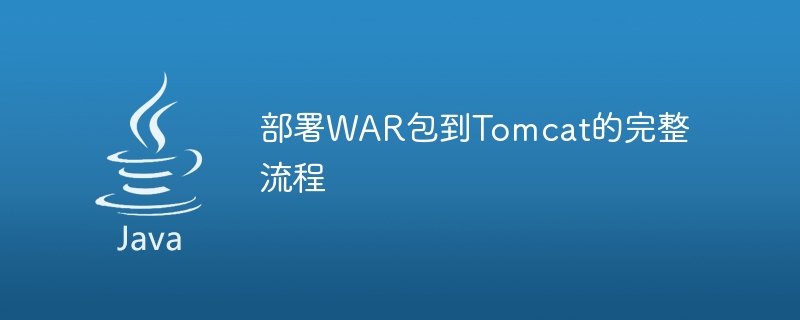Home >Java >javaTutorial >Detailed explanation of the steps to deploy WAR files in Tomcat
Detailed explanation of the steps to deploy WAR files in Tomcat
- 王林Original
- 2024-01-13 14:37:061412browse

The complete process of deploying WAR packages to Tomcat requires specific code examples
Tomcat is a widely used Java application server for running Java Web applications. It supports deploying and publishing web applications through WAR (Web Application Archive) packages. Below we will introduce in detail how to use Tomcat to deploy WAR packages and provide specific code examples.
Step 1: Install Tomcat
First, you need to download and install Tomcat. You can download the Tomcat version suitable for your operating system from the official Tomcat website (https://tomcat.apache.org). After the download is complete, install it according to the instructions in the official documentation.
Step 2: Create a Web Application
Before deploying the WAR package, we need to create a Web application. This can be done by using Java web development frameworks such as Spring MVC, Servlet, etc. In this article, we use Spring MVC as an example to create a simple web application.
First, create a new Java project and configure it as a Java Web project. Then, add a simple Spring MVC controller as shown below:
@Controller
public class HelloWorldController {
@RequestMapping("/")
public String hello(Model model) {
model.addAttribute("message", "Hello, World!");
return "hello";
}
}In the above code, we have defined a simple controller called HelloWorldController. It uses the @RequestMapping annotation to map the root path "/" to the hello method. In the hello method, we add a property called "message" to the Model and return a string called "hello" as the view name.
Step 3: Build WAR package
Before deployment, we need to package the web application as a WAR package. This process can be accomplished using build tools such as Maven or Gradle. A sample pom.xml file using Maven is as follows:
<project xmlns="http://maven.apache.org/POM/4.0.0"
xmlns:xsi="http://www.w3.org/2001/XMLSchema-instance"
xsi:schemaLocation="http://maven.apache.org/POM/4.0.0 http://maven.apache.org/xsd/maven-4.0.0.xsd">
<modelVersion>4.0.0</modelVersion>
<groupId>com.example</groupId>
<artifactId>mywebapp</artifactId>
<packaging>war</packaging>
<version>1.0.0</version>
<dependencies>
<!-- 添加Spring MVC依赖 -->
<dependency>
<groupId>org.springframework</groupId>
<artifactId>spring-webmvc</artifactId>
<version>5.2.0.RELEASE</version>
</dependency>
</dependencies>
</project>In the above example, we used a project called mywebapp and packaged it as a WAR file. We also added a dependency on Spring MVC for use at runtime.
Step 4: Deploy the WAR package to Tomcat
After you complete building the WAR package, you can deploy it to Tomcat. The following is a sample process:
-
Copy the generated WAR package to Tomcat's
webappsdirectory.cp target/mywebapp.war $CATALINA_HOME/webapps/
-
Start the Tomcat server.
$CATALINA_HOME/bin/startup.sh
-
Access the deployed web application in the browser.
http://localhost:8080/mywebapp/
In the above example, we copy the WAR package to Tomcat's webapps directory, and then start the Tomcat server. Once the server is started, you can access the deployed web application in your browser.
Summary:
This article introduces how to use Tomcat to deploy WAR packages and provides specific code examples. First, we installed Tomcat and created a simple Spring MVC web application. We then use Maven to package the application as a WAR package. Finally, we copy the WAR package to Tomcat's webapps directory and start the Tomcat server to deploy the web application. I hope this article can help you understand the complete process of WAR package deployment.
The above is the detailed content of Detailed explanation of the steps to deploy WAR files in Tomcat. For more information, please follow other related articles on the PHP Chinese website!
Related articles
See more- How to solve the problem that tomcat cannot access after deploying the war package
- Solve the common problem of inaccessibility after Tomcat deploys war package
- How to solve the problem of inaccessibility after Tomcat deploys war package
- How to solve the problem of inaccessibility after Tomcat deploys war package
- Detailed guide to deploying WAR packages in Tomcat

